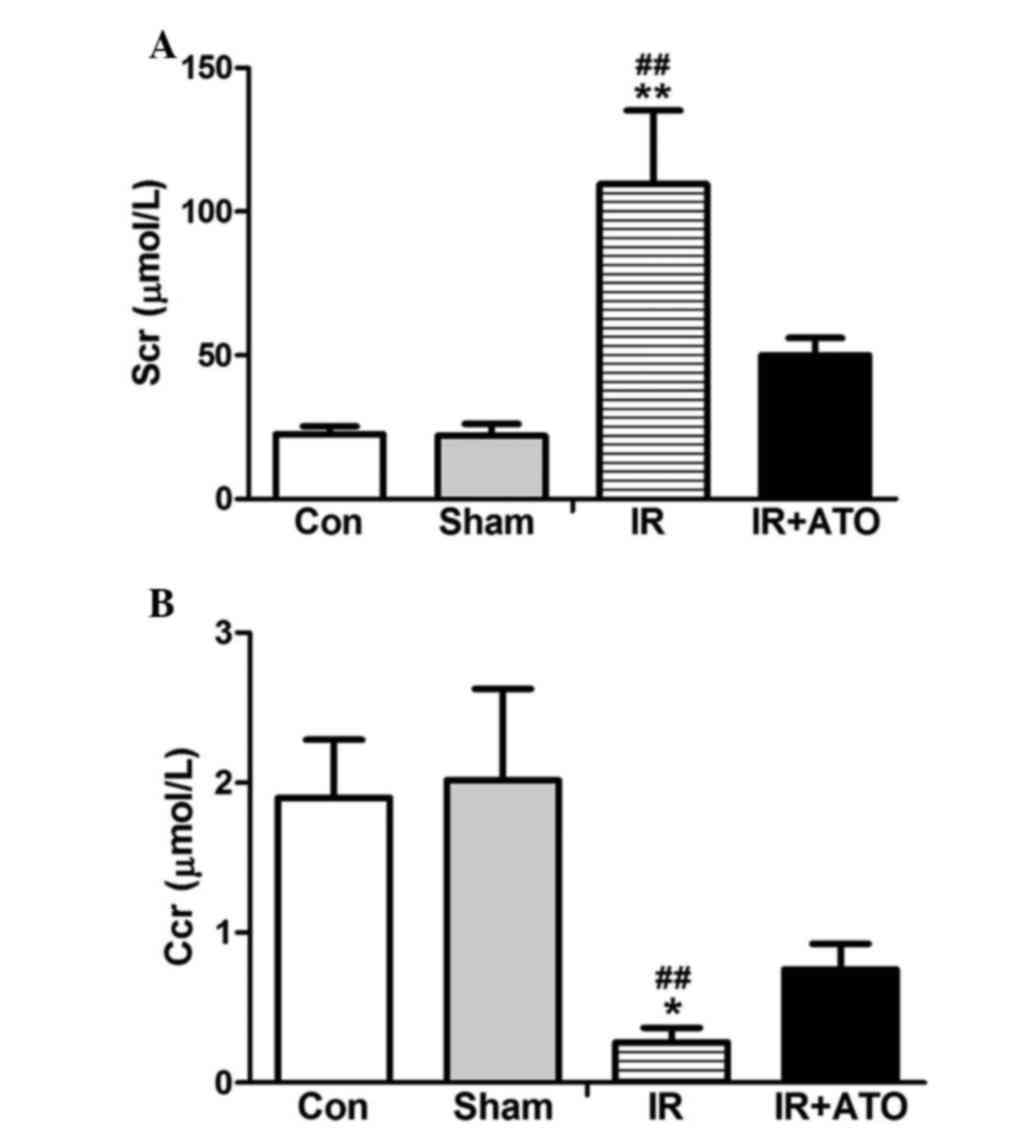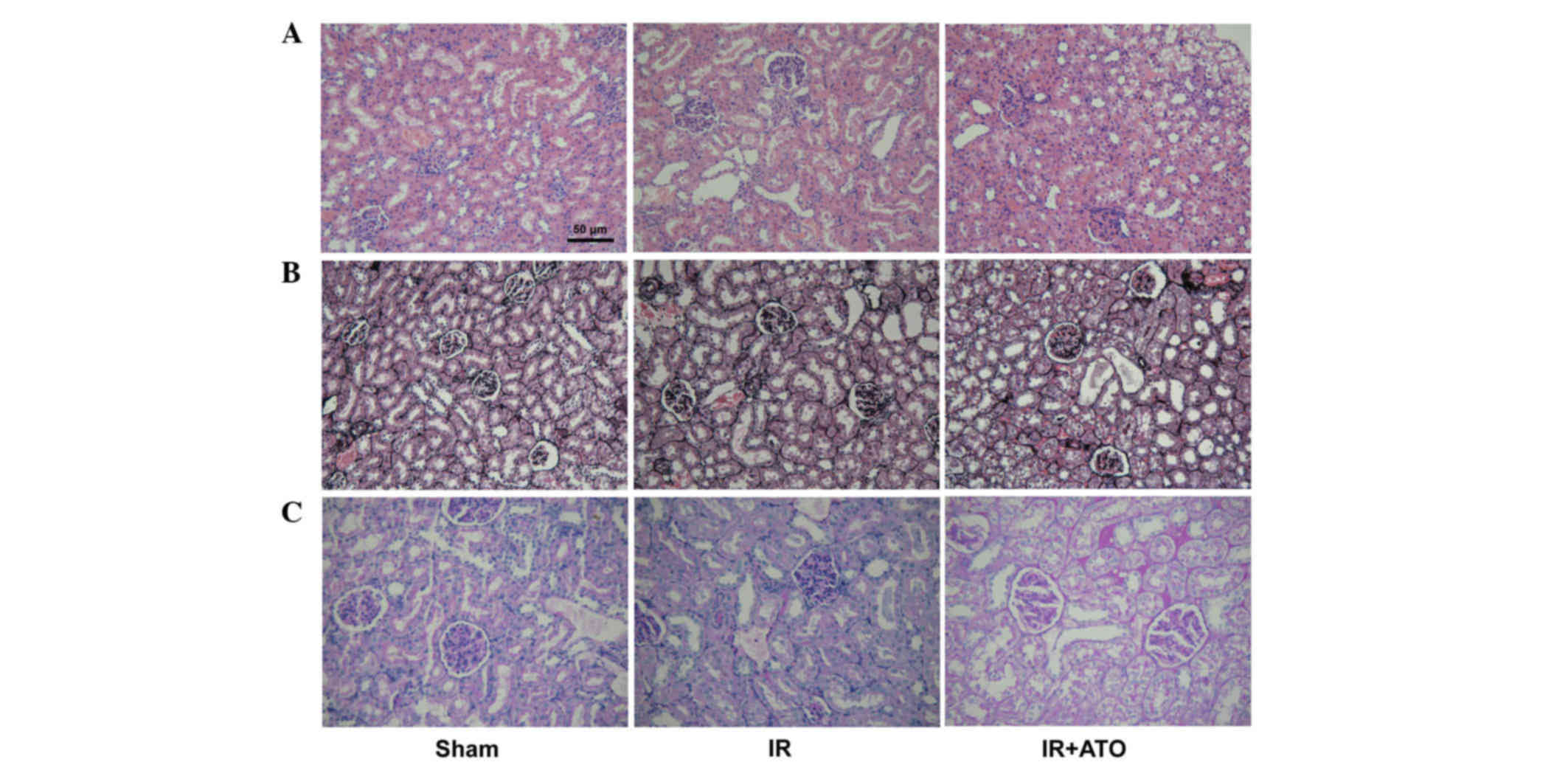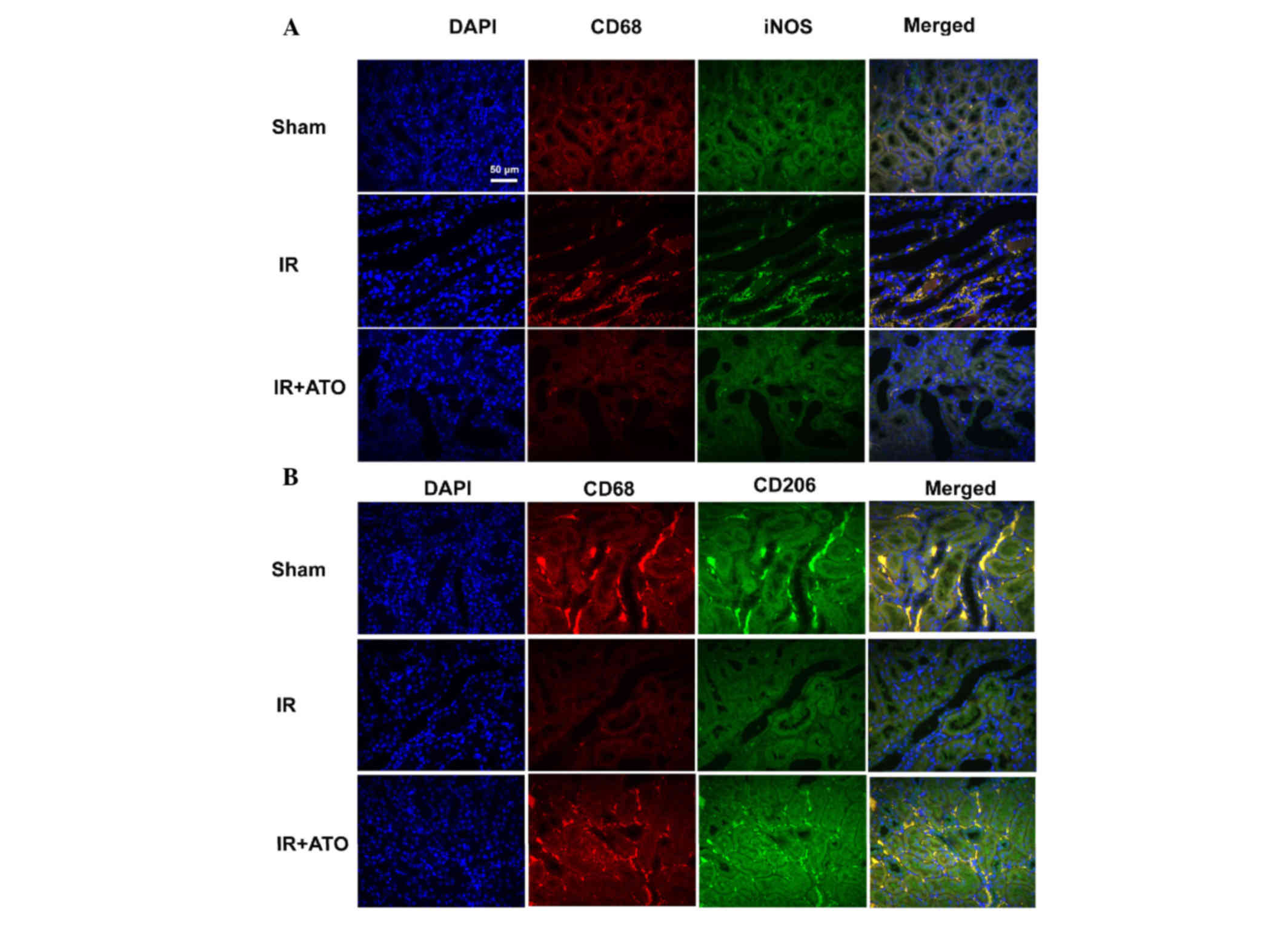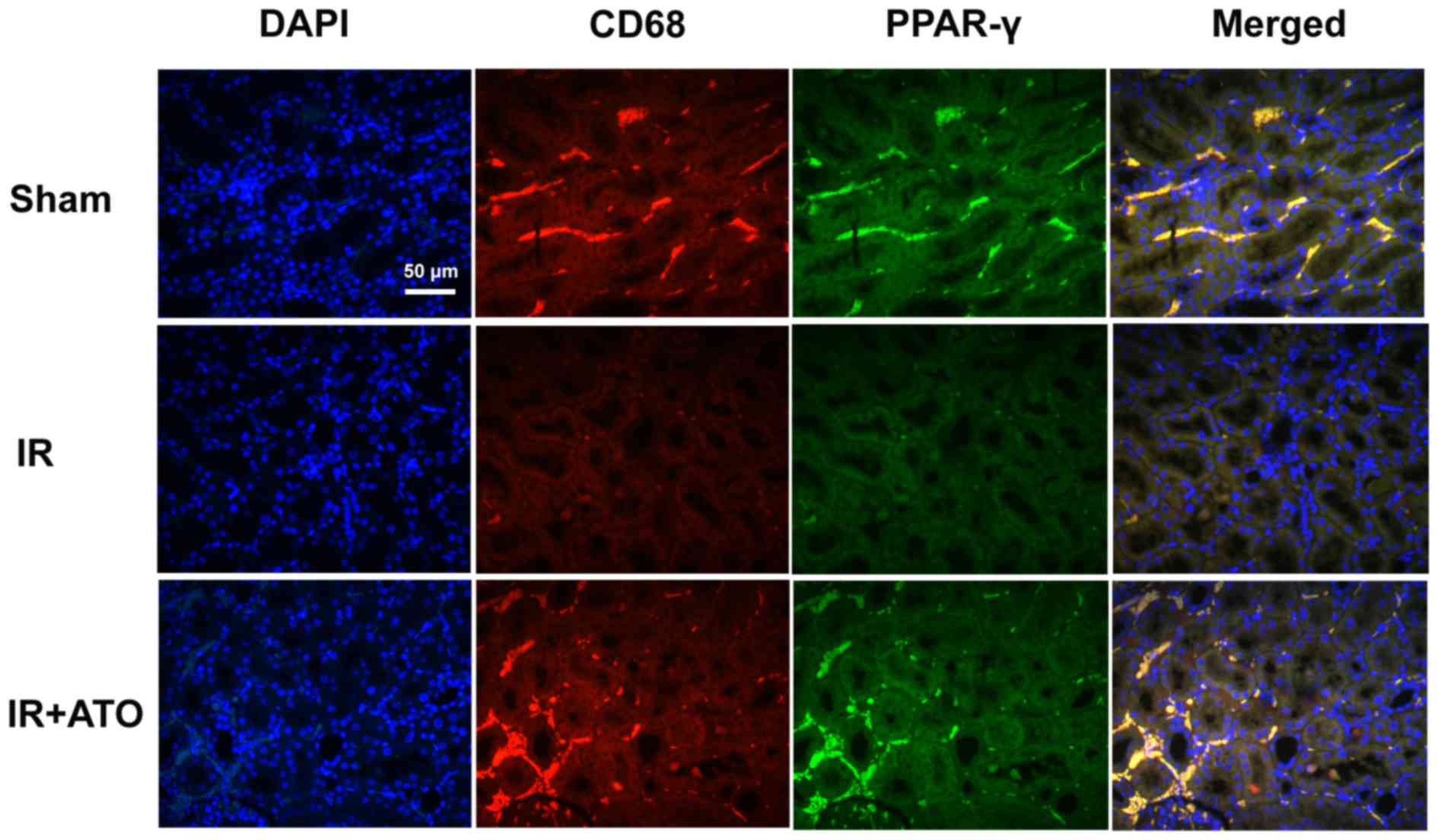|
1
|
Devarajan P: Emerging biomarkers of acute
kidney injury. Contrib Nephrol. 156:203–212. 2007. View Article : Google Scholar : PubMed/NCBI
|
|
2
|
Kinsey GR, Li L and Okusa MD: Inflammation
in acute kidney injury. Nephron Exp Nephrol. 109:e102–e107. 2008.
View Article : Google Scholar : PubMed/NCBI
|
|
3
|
Deng J, Kohda Y, Chiao H, Wang Y, Hu X,
Hewitt SM, Miyaji T, McLeroy P, Nibhanupudy B, Li S and Star RA:
Interleukin-10 inhibits ischemic and cisplatin-induced acute renal
injury. Kidney Int. 60:2118–2128. 2001. View Article : Google Scholar : PubMed/NCBI
|
|
4
|
Kunzendorf U, Haase M, Rolver L and
Haase-Fielitz A: Novel aspects of pharmacological therapies for
acute renal failure. Drugs. 70:1099–1114. 2010. View Article : Google Scholar : PubMed/NCBI
|
|
5
|
Geissmann F, Manz MG, Jung S, Sieweke MH,
Merad M and Ley K: Development of monocytes, macrophages, and
dendritic cells. Science. 327:656–661. 2010. View Article : Google Scholar : PubMed/NCBI
|
|
6
|
Ginhoux F and Jung S: Monocytes and
macrophages: Developmental pathways and tissue homeostasis. Nat Rev
Immunol. 14:392–404. 2014. View
Article : Google Scholar : PubMed/NCBI
|
|
7
|
Palmer MB, Vichot AA, Cantley LG and
Moeckel GW: Quantification and localization of M2 macrophages in
human kidneys with acute tubular injury. Int J Nephrol Renovasc
Dis. 7:415–419. 2014.PubMed/NCBI
|
|
8
|
Wang Y and Harris DC: Macrophages in renal
disease. J Am Soc Nephrol. 22:21–27. 2011. View Article : Google Scholar : PubMed/NCBI
|
|
9
|
Hunter MM, Wang A, Parhar KS, Johnston MJ,
Van Rooijen N, Beck PL and McKay DM: In vitro-derived alternatively
activated macrophages reduce colonic inflammation in mice.
Gastroenterology. 138:1395–1405. 2010. View Article : Google Scholar : PubMed/NCBI
|
|
10
|
Naruszewicz M: Macrophages in the
pathogenesis of atherosclerosis. Advances in science and personal
observations. Kardiol Pol. 32:27–34. 1989.(In Polish). PubMed/NCBI
|
|
11
|
Olefsky JM and Glass CK: Macrophages,
inflammation, and insulin resistance. Annu Rev Physiol. 72:219–246.
2010. View Article : Google Scholar : PubMed/NCBI
|
|
12
|
Murray PJ and Wynn TA: Protective and
pathogenic functions of macrophage subsets. Nat Rev Immunol.
11:723–737. 2011. View
Article : Google Scholar : PubMed/NCBI
|
|
13
|
Sica A and Mantovani A: Macrophage
plasticity and polarization: In vivo veritas. J Clin Invest.
122:787–795. 2012. View
Article : Google Scholar : PubMed/NCBI
|
|
14
|
Mroz RM, Lisowski P, Tycinska A, Bierla J,
Trzeciak PZ, Minarowski L, Milewski R, Lisowska A, Boros P,
Sobkowicz B, et al: Anti-inflammatory effects of atorvastatin
treatment in chronic obstructive pulmonary disease. A controlled
pilot study. J Physiol Pharmacol. 66:111–128. 2015.PubMed/NCBI
|
|
15
|
Wu K, Lei W, Tian J and Li H: Atorvastatin
treatment attenuates renal injury in an experimental model of
ischemia-reperfusion in rats. BMC Nephrol. 15:142014. View Article : Google Scholar : PubMed/NCBI
|
|
16
|
Zhang O and Zhang J: Atorvastatin promotes
human monocyte differentiation toward alternative M2 macrophages
through p38 mitogen-activated protein kinase-dependent peroxisome
proliferator-activated receptor γ activation. Int Immunopharmacol.
26:58–64. 2015. View Article : Google Scholar : PubMed/NCBI
|
|
17
|
Paller MS, Hoidal JR and Ferris TF: Oxygen
free radicals in ischemic acute renal failure in the rat. J Clin
Invest. 74:1156–1164. 1984. View Article : Google Scholar : PubMed/NCBI
|
|
18
|
Xue W, Lei J, Li X and Zhang R: Trigonella
foenum graecum seed extract protects kidney function and morphology
in diabetic rats via its antioxidant activity. Nutr Res.
31:555–562. 2011. View Article : Google Scholar : PubMed/NCBI
|
|
19
|
Ghobadi H, Lari SM, Pourfarzi F,
Mahmoudpour A and Ghanei M: The effects of atorvastatin on
mustard-gas-exposed patients with chronic obstructive pulmonary
disease: A randomized controlled trial. J Res Med Sci. 19:99–105.
2014.PubMed/NCBI
|
|
20
|
Dong X, Swaminathan S, Bachman LA, Croatt
AJ, Nath KA and Griffin MD: Resident dendritic cells are the
predominant TNF-secreting cell in early renal ischemia-reperfusion
injury. Kidney Int. 71:619–628. 2007. View Article : Google Scholar : PubMed/NCBI
|
|
21
|
Meldrum KK, Meldrum DR, Meng X, Ao L and
Harken AH: TNF-alpha-dependent bilateral renal injury is induced by
unilateral renal ischemia-reperfusion. Am J Physiol Heart Circ
Physiol. 282:H540–H546. 2002. View Article : Google Scholar : PubMed/NCBI
|
|
22
|
Donnahoo KK, Meng X, Ayala A, Cain MP,
Harken AH and Meldrum DR: Early kidney TNF-alpha expression
mediates neutrophil infiltration and injury after renal
ischemia-reperfusion. Am J Physiol. 277:R922–R929. 1999.PubMed/NCBI
|
|
23
|
Kluth DC, Erwig LP and Rees AJ: Multiple
facets of macrophages in renal injury. Kidney Int. 66:542–557.
2004. View Article : Google Scholar : PubMed/NCBI
|
|
24
|
Ferenbach DA, Ramdas V, Spencer N, Marson
L, Anegon I, Hughes J and Kluth DC: Macrophages expressing heme
oxygenase-1 improve renal function in ischemia/reperfusion injury.
Mol Ther. 18:1706–1713. 2010. View Article : Google Scholar : PubMed/NCBI
|
|
25
|
Westenfelder C: Programmed
anti-inflammatory macrophages protect against AKI and promote
repair through trophic actions. Kidney Int. 81:939–941. 2012.
View Article : Google Scholar : PubMed/NCBI
|
|
26
|
Lee S, Huen S, Nishio H, Nishio S, Lee HK,
Choi BS, Ruhrberg C and Cantley LG: Distinct macrophage phenotypes
contribute to kidney injury and repair. J Am Soc Nephrol.
22:317–326. 2011. View Article : Google Scholar : PubMed/NCBI
|
|
27
|
Tontonoz P and Spiegelman BM: Fat and
beyond: The diverse biology of PPARgamma. Annu Rev Biochem.
77:289–312. 2008. View Article : Google Scholar : PubMed/NCBI
|
|
28
|
Penas F, Mirkin GA, Vera M, Cevey Á,
González CD, Gómez MI, Sales ME and Goren NB: Treatment in vitro
with PPARα and PPARα ligands drives M1-to-M2 polarization of
macrophages from T. cruzi-infected mice. Biochim Biophys Acta.
1852:893–904. 2015. View Article : Google Scholar : PubMed/NCBI
|
|
29
|
Pisanu A, Lecca D, Mulas G, Wardas J,
Simbula G, Spiga S and Carta AR: Dynamic changes in pro- and
anti-inflammatory cytokines in microglia after PPAR-α agonist
neuroprotective treatment in the MPTPp mouse model of progressive
Parkinson's disease. Neurobiol Dis. 71:280–291. 2014. View Article : Google Scholar : PubMed/NCBI
|
|
30
|
Grip O, Janciauskiene S and Lindgren S:
Atorvastatin activates PPAR-gamma and the inflammatory response in
human monocytes. Inflamm Res. 51:58–62. 2002. View Article : Google Scholar : PubMed/NCBI
|




















